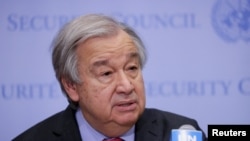The U.N. Secretary-General warned Wednesday that as a result of Russia’s war in Ukraine, the developing world is facing a “perfect storm” threatening to devastate many of economies.
“As many as 1.7 billion people — one third of whom are already living in poverty — are now highly exposed to disruptions in food, energy and finance systems that are triggering increases in poverty and hunger,” Antonio Guterres told reporters.
He said 36 countries, including some of the world’s poorest, depend on Russia and Ukraine for more than half of their wheat imports.
“Prices were already on the rise, the war has made a bad situation far worse,” he said, noting that wheat and maize prices have risen 30% just since January.
The war has also led to a rapid doubling of oil and gas prices, as countries work to ban Russian energy exports to cut President Vladimir Putin’s ability to finance his war.
Russia is also the world’s top fertilizer producer. Prices have also doubled for that critical input, which means crop yields could dramatically decrease.
“As prices climb, so does hunger and malnutrition – especially for young children,” Guterres said.
The U.N. chief expressed concern that rising global inflation is cutting purchasing power, hurting domestic growth and slowing development and even eroding progress. He said developing countries are especially hard hit with high debt.
“This is setting in motion a potential vicious circle of inflation and stagnation — so-called stagflation,” Guterres said.
The U.N. chief made his remarks at the launch of the first report of the Global Crisis Response Group taskforce he appointed after Russia’s invasion, when it became apparent such impacts could be felt.
The report offers several recommendations to mitigate the impacts of the food, energy and finance disruptions, including ensuring a steady flow of food and energy through open markets and lifting unnecessary export restrictions. For food supplies, the taskforce urges sending surpluses to countries in need and not raising food prices. And on the fuel front, the taskforce urges governments to release strategic stockpiles.
“This is not a crisis that can be solved piecemeal, country-by-country,” Guterres said. “This global and systemic emergency requires global and systemic solutions.”
But above all, he said the solution lies in ending the war in Ukraine.
“The people of Ukraine cannot bear the violence being inflicted on them,” he said. “And the most vulnerable people around the world cannot become collateral damage in yet another disaster for which they bear no responsibility.”





